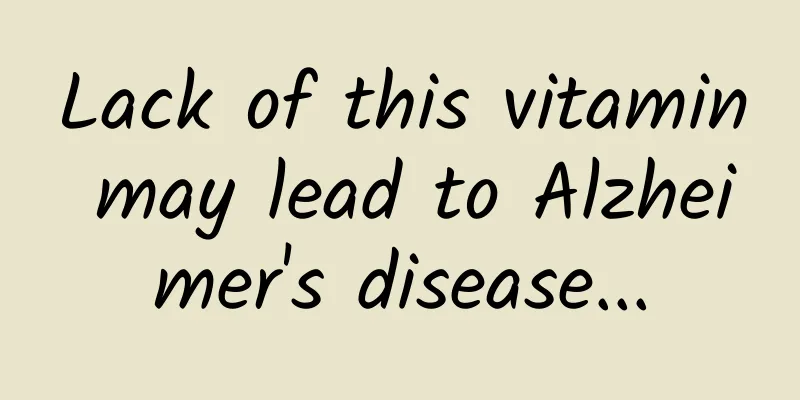Lack of this vitamin may lead to Alzheimer's disease...

|
Reviewer of this article: Chen Haixu, Deputy Director and Master Supervisor of the Second Medical Center of PLA General Hospital Alzheimer's disease is one of the leading causes of disability among older people worldwide, affecting thinking and behavior as people age. Can the progression of this degenerative disease be stopped? A world-first from the University of South Australia (UniSA) may make that possible - new genetic research shows a direct link between Alzheimer's and vitamin D deficiency. Recently, the relevant research was published in the American Journal of Clinical Nutrition. Copyright image, no permission to reprint After investigating the association between vitamin D, neuroimaging features, and the risk of Alzheimer's disease and stroke, the researchers found that low levels of vitamin D were associated with lower brain volume and an increased risk of Alzheimer's disease and stroke; genetic analysis supported a causal relationship between vitamin D deficiency and Alzheimer's disease; and in some populations, raising people's vitamin D levels to normal levels (50nmol/L) could prevent up to 17% of Alzheimer's disease. The genetic study analysed data from 294,514 participants in the UK Biobank, investigating the effects of low levels of vitamin D (25 nmol/L) and the risk of Alzheimer's disease and stroke. Nonlinear Mendelian randomization (MR)—a method that uses measurable genetic variation to examine the causal effects of variable exposures on disease—was used to test potential causal relationships between neuroimaging findings, Alzheimer's disease, and stroke. UniSA Australian Centre for Precision Health Director Elina Hyppönen said the findings were important for preventing Alzheimer's disease and recognizing the need to eliminate vitamin D deficiency. “Vitamin D is a hormone precursor that is increasingly recognized to have broad effects, including on brain health.” Copyright image, no permission to reprint The study is the first to examine the impact of very low levels of vitamin D on the risk of Alzheimer's disease and stroke by genetically analyzing a large number of people. "Given that vitamin D deficiency is relatively common, our findings have important implications for protecting against the risk of Alzheimer's disease. In fact, in the UK population analyzed, we observed that raising vitamin D levels to the normal range could prevent up to 17% of Alzheimer's disease," says Hyppönen. Alzheimer's disease is a chronic or progressive syndrome that causes cognitive deterioration. About 487,500 Australians have Alzheimer's disease, making it the second leading cause of death in the country. More than 55 million people worldwide suffer from Alzheimer's disease, with 10 million new cases diagnosed each year. This finding is significant given the high incidence of Alzheimer's disease worldwide. Copyright image, no permission to reprint “By eliminating severe vitamin D deficiency, we could make hundreds of thousands of people healthier,” Hyppönen said. “Most people will probably be fine, but for those who for some reason don’t get enough vitamin D from the sun, adjusting their diet may not be enough and they may need additional vitamin D supplementation.” Source: China Science Daily Author: Wen Lele The watermarked images and cover images in this article are from the copyright gallery, and the image content is not authorized for reprinting |
Recommend
The efficacy and function of bilberry leaves
As a traditional Chinese medicine, bilberry leave...
The efficacy and function of Niu Er Feng root
The root of the truncatum is a medicinal material...
The difference between Fritillaria thunbergii and Fritillaria cirrhosa
There are different varieties of Fritillaria in d...
Huangqi Shengmai Yin
The Chinese have had medical books thousands of y...
What are the Chinese medicines for lowering cholesterol?
Now we can find that the weather is really gettin...
What are the effects and functions of birch tears?
Birch tears, also known as birch sap, are a liqui...
The efficacy and function of Polygonum multiflorum
Many people are not very clear about the effects ...
The efficacy and function of hemp grass
I believe many people are familiar with the Chine...
Such a cute bird! The parrot tears the paper and tries to insert "feathers" to turn into a peacock?
Not long ago, a funny video about a parrot shot b...
The efficacy and function of tea root
Traditional Chinese medicine is a Chinese traditi...
Can white Poria powder be eaten?
We can see the Chinese medicine Bai Fuling in som...
The efficacy and function of tiger
Modern medical research believes that the mountai...
The high bypass ratio engine is put into use, and the combat capability of the Y-20 has undergone a qualitative change
In April 2023, many people found that there was s...
The "grain of democracy" sent by the US military? Syrian experts: It is a hidden danger!
40% contain nematodes This is America's "...
What are the pharmacological effects of Poria cocos?
Poria cocos can be used as medicine. Because Pori...









